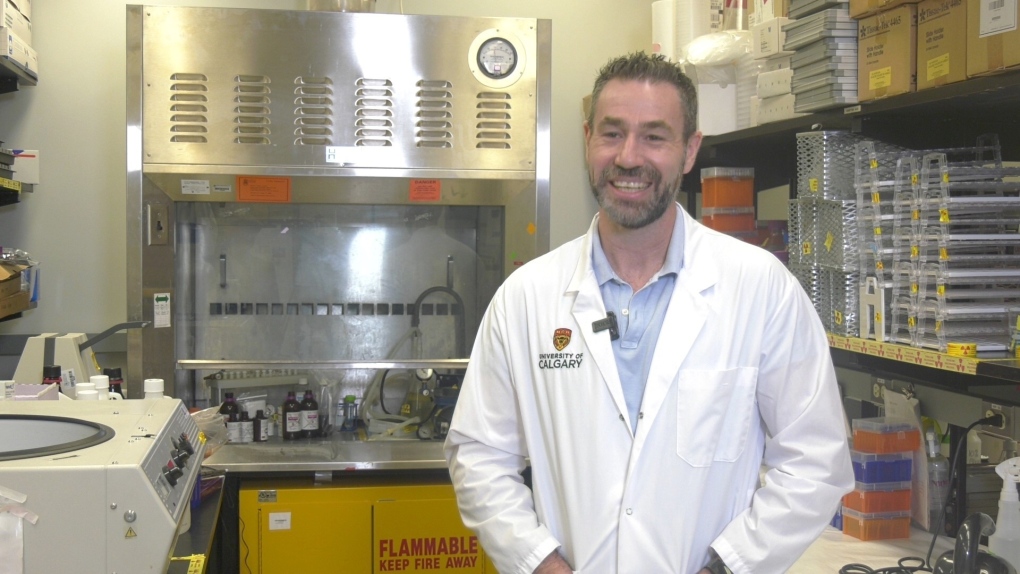Mental Health Initiative for Stress and Trauma launching in aftermath of Calgarian's tragic death
A new research chair at the University of Calgary Cumming School of Medicine and the Hotchkiss Brain Institute will examine how stress and trauma impact the brain, and ultimately an individual’s mental health.
The Mental Health Initiative for Stress and Trauma (MIST) will be led by Dr. Matthew Hill.
“The research purpose is to further our understanding of the effects of stress on the brain and how this relates to the development of mental health issues such as anxiety, depression, or post-traumatic stress disorder,” Hill said.
“The other research arm of the MIST chair is really to try and understand the intersection of how concussion and head trauma can influence the way that our brain processes stress and emotional states, to look at the relationship that we know exists between head trauma and the development of mental health conditions.”
Over the past two decades, Hill has researched the neurobiology of stress, and how it relates to psychiatric illness.
For the past 11 years, his lab has been working to better understand how stress hormones modify brain function, behaviour and metabolism.
“It's very well-established that, certainly in individuals that have undergone head trauma and, say, repetitive injuries from sports, or in the context of veterans, where they've had traumas from deployment, that there is a much greater incidence of mental health conditions in those individuals than there is in the general population,” Hill said.
“That does suggest that there is some causative role that exists for concussion and head trauma in the subsequent development of mental illness.”
 The Mental Health Initiative for Stress and Trauma (MIST) will be led by Dr. Matthew Hill.
The Mental Health Initiative for Stress and Trauma (MIST) will be led by Dr. Matthew Hill.
MIST was formed after the tragic death of Mike McClay, a father of two, who died by suicide in October 2021.
Two years earlier, McClay suffered a concussion after falling from a ladder.
That physical trauma, combined with other stressors, may have played a role in his death.
“Our friend, Mike, was not a person who was a quitter – not a person who gave up,” said McClay’s friend Trevor Johnson.
“This guy was a winner. And we were just dumbfounded by the news that he had been in such a state that he chose to take his own life.”
In an effort to understand his death, and help prevent other families from experiencing similar losses, McClay’s family and friends turned to UCalgary to search for answers, and eventually raised more than $300,000 to develop the MIST chair.
“This is an issue that affects a lot of people, in males, females, people of different ages. It's family members, friends and the workforce. So, it's got a broad level of effect on the entire community,” Johnson said.
“Maybe there's something that can be done, you know, we could help answer questions, and also help prevent other people from suffering the way that our friend was, and then hopefully, ultimately, prevent someone from making the choice to take their own life.”
 MIST was formed after the tragic death of Mike McClay, a father of two, who died by suicide in October 2021.
MIST was formed after the tragic death of Mike McClay, a father of two, who died by suicide in October 2021.
Unchecked, brain trauma can lead to the development of psychiatric conditions.
UCalgary researchers have intensified their focus on traumatic brain injuries, like concussions, in an attempt to see how they affect a person’s ability to process emotional stress.
“Another component of this as well, is to also educate the public on understanding that there is a relationship that exists between concussion and head trauma and the subsequent development of mental health issues,” Hill said.
“That's one of the key questions that we're looking at – trying to understand if there is a mechanism that can link the relationship that currently exists between concussion head trauma and mental health issues.”
A major focus of Hill’s research is on the endocannabinoid system – the system THC, which is the psychoactive component of cannabis, affects.
The human body also produces its own chemicals that stimulate the endocannabinoid system as a response to stress.
Hill’s research shows some stress-related psychiatric disorders seem to be associated with impaired endocannabinoid function.
“We know that some individuals are more vulnerable to the effects of stress, and have this ability to kind of stay locked in a stress state long after the experience that was stressful has passed,” Hill said.
“Part of what we think might be causing that is, that in some individuals, they have impaired endocannabinoid functions, so they don't maintain appropriate endocannabinoid response to calm the brain back down.”
Hill is also collaborating the head of the Parker Psychedelic Research Chair, Dr. Leah Mayo, who is researching ways to boost endocannabinoid levels to treat PTSD.
Hill and Mayo have undertaken clinical trials examining the efficacy of new treatments.
McClay’s family and friends continue to raise money to fund MIST, aiming to hit the $10-million mark.
Donations can be made online through the UCalgary Engage website.
In Canada, 4,500 people (12 people a day) die by suicide.
If your life or someone else’s is in danger, call 911 for emergency services, Distress Centre Calgary at 403-266-4357 or the Canada Suicide Prevention Service at 1-833-456-4566.
CTVNews.ca Top Stories

DEVELOPING Man sets self on fire outside New York court where Trump trial underway
A man set himself on fire on Friday outside the New York courthouse where Donald Trump's historic hush-money trial was taking place as jury selection wrapped up, but officials said he did not appear to have been targeting Trump.
Sask. father found guilty of withholding daughter to prevent her from getting COVID-19 vaccine
Michael Gordon Jackson, a Saskatchewan man accused of abducting his daughter to prevent her from getting a COVID-19 vaccine, has been found guilty for contravention of a custody order.
She set out to find a husband in a year. Then she matched with a guy on a dating app on the other side of the world
Scottish comedian Samantha Hannah was working on a comedy show about finding a husband when Toby Hunter came into her life. What happened next surprised them both.
Mandisa, Grammy award-winning 'American Idol' alum, dead at 47
Soulful gospel artist Mandisa, a Grammy-winning singer who got her start as a contestant on 'American Idol' in 2006, has died, according to a statement on her verified social media. She was 47.
'It could be catastrophic': Woman says natural supplement contained hidden painkiller drug
A Manitoba woman thought she found a miracle natural supplement, but said a hidden ingredient wreaked havoc on her health.
Young people 'tortured' if stolen vehicle operations fail, Montreal police tell MPs
One day after a Montreal police officer fired gunshots at a suspect in a stolen vehicle, senior officers were telling parliamentarians that organized crime groups are recruiting people as young as 15 in the city to steal cars so that they can be shipped overseas.
The Body Shop Canada explores sale as demand outpaces inventory: court filing
The Body Shop Canada is exploring a sale as it struggles to get its hands on enough inventory to keep up with "robust" sales after announcing it would file for creditor protection and close 33 stores.
Vicious attack on a dog ends with charges for northern Ont. suspect
Police in Sault Ste. Marie charged a 22-year-old man with animal cruelty following an attack on a dog Thursday morning.
On federal budget, Macklem says 'fiscal track has not changed significantly'
Bank of Canada governor Tiff Macklem says Canada's fiscal position has 'not changed significantly' following the release of the federal government's budget.
































